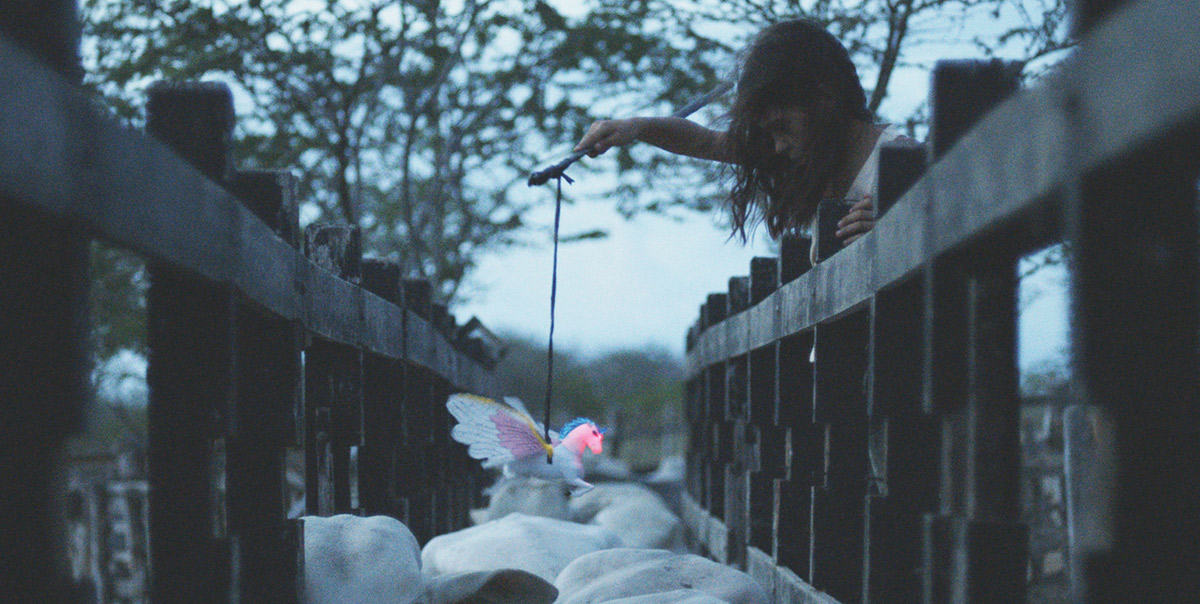More often than not, the first thing a given critic discusses when diving into a film (besides its narrative) is the work of the director. And in many cases that’s more than justified. Especially when that director is a superb craftsman like Gabriel Mascaro. However, for the director’s latest film, one of its greatest stars isn’t in front of the screen or directing the action, instead he’s a beloved photographer lensing what may very well be one of the year’s most profoundly beautiful motion pictures.
Entitled Neon Bull Mascaro taps Diego Garcia to shoot his story of gender roles within the world of Brazilian rodeo, the vaquejada, a sport where cowboys try to rope bulls by their tails only to drag them violently to the ground. Focusing on a handsome, strong cowboy named Iremar who daydreams of becoming a fashion designer, the film spends the majority of its time with Iremar as he spends time with his truck driver right hand lady, her daughter Caca and his friend Ze. This fluidity within gender roles is at the very heart and soul of the film, and appears to even be in the eye of the direction and photography.
I hesitate to spoil anything specific, but there’s one scene that ostensibly closes the picture, a sex scene between Iremar and an incredibly pregnant and utterly stunning shopping center security guard, that is one of the year’s most moving and powerful sequences. Rarely, if ever, do we see women as a gender but more specifically pregnant women, pleasured this vividly, finding her body as both a sexual entity and more profoundly a work of biological art. Beautifully shot with a stark intimacy and disinterest in pulling any sort of punches (there’s also an earlier sex scene involving Galega that is entirely about the female body and its sexual pleasure) Garcia’s work is both naturalistic and yet has bursts of absolute surrealism. The difference between Mascaro’s tableaus and his brief experiments in dream-like impressionism (particularly an oddly erotic dance from Galega, featuring her wearing hooves and a bull head) make this film absolutely magnetic.
The story here is also sort of fluid, or at least it has little actual import. The viewer is privy to the daily minutia of Iremar’s life, so while the film narratively may feel slight in some ways, the impact of moments like Iremar drawing a new design over a torn out page from an adult magazine is deep and heartfelt. The spurts of surrealism add an instant impact as a change of pace in many ways, all in all turning Neon Bull into a supremely emotional and devastating meditation on gender roles and particularly masculinity.
It also helps that the performances here are top tier. Juliano Cazarre stars as Iremar, and is an absolute stud. Besides having just the right hyper masculine look that makes the central themes all the more powerful, there’s a quiet energy to each motion with Cazarre, an understated machismo that is an absolute delight to see on screen. Maeve Jinkings co-stars as Galega, and she’s also quite a joy. The interactions between the two are truly great, particularly in their relationship to Alyne Santana’s Caca. Neon Bull is a film chock full, if not entirely driven by, nuance, and the performances are no different. Writer/Director Mascaro is a relatively unknown filmmaker in many circles, but with this and his previous, debut, narrative feature August Winds it’s crystal clear that this is a director at the very top of his game. This is a film that can not be missed, under any circumstance.






![Bergman Island (The Criterion Collection) [Blu-ray]](https://criterioncast.com/wp-content/uploads/2022/11/bergman-island-the-criterion-collection-blu-ray-400x496.jpg)
![This Is Not a Burial, It’s a Resurrection (The Criterion Collection) [Blu-ray]](https://criterioncast.com/wp-content/uploads/2022/11/this-is-not-a-burial-its-a-resurrection-the-criterion-collection-blu-ray-400x496.jpg)
![Lars von Trier's Europe Trilogy (The Criterion Collection) [The Element of Crime/Epidemic/Europa] [Blu-ray]](https://criterioncast.com/wp-content/uploads/2022/11/lars-von-triers-europe-trilogy-the-criterion-collection-the-element-of-400x496.jpg)
![Imitation of Life (The Criterion Collection) [Blu-ray]](https://criterioncast.com/wp-content/uploads/2022/11/imitation-of-life-the-criterion-collection-blu-ray-400x496.jpg)
![The Adventures of Baron Munchausen (The Criterion Collection) [4K UHD]](https://criterioncast.com/wp-content/uploads/2022/11/the-adventures-of-baron-munchausen-the-criterion-collection-4k-uhd-400x496.jpg)
![Cooley High [Criterion Collection] [Blu-ray] [1975]](https://criterioncast.com/wp-content/uploads/2022/11/cooley-high-criterion-collection-blu-ray-1975-400x496.jpg)